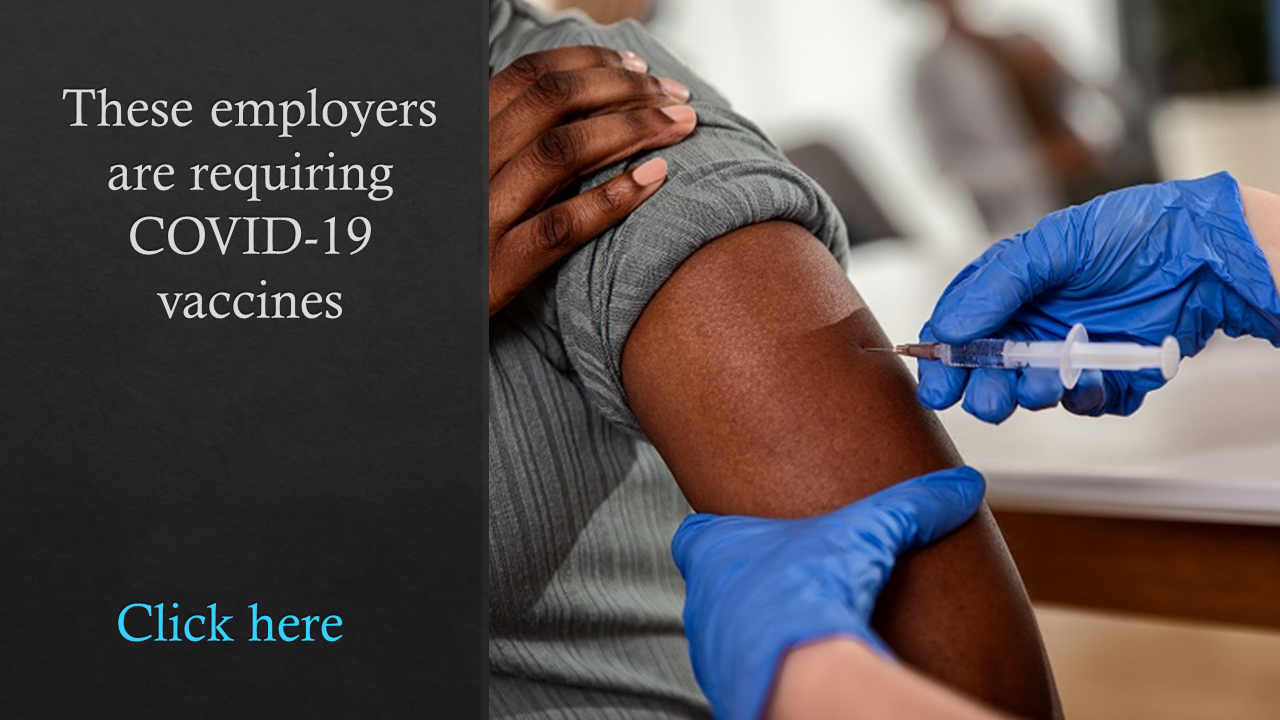With the U.S. Food and Drug Administration officially approving the Pfizer COVID-19 vaccine this week, employers are likely to get even more aggressive about their vaccination plans and requirements.
Among the employers that announced new requirements following the approval were CVS Health, which said all corporate employees and certain clinical workers who interact with patients would have to get inoculated, and the Ohio State University, which announced Tuesday that it would require all students, faculty and staff to complete the full vaccination process by Nov. 15. Experts expect many more will follow.

“Approval of the Pfizer vaccine is likely to further accelerate the momentum of companies mandating the vaccine for their employees for several reasons,” says Brian Kropp, chief of research in the Gartner HR practice. (For the past eight months, the COVID-19 shots were authorized under emergency use.)
More government agencies will mandate it, as the Pentagon did upon news of the FDA approval, which means “all of the companies that partner and are consultants to the federal government can now mandate vaccines for all of the employees at those organizations that they partner with,” he says. Universities are also jumping on board to mandate COVID-19 vaccination, which is accelerating the trend of employer mandates.
Importantly, the FDA approval gives employer mandates more legitimacy than they had previously.
“When it comes to the private sector, [the FDA approval] gives companies the ability to shift the responsibility from the company saying that the vaccine is safe to the government officially saying that the vaccine is safe,” Kropp says. “This shift of responsibility makes it easier for companies to implement a vaccine mandate.”
The shot’s approval, coupled with the surging Delta variant and a recent call on employers from President Biden and other White House officials to mandate vaccines, will only further push employers to act aggressively on vaccines.
Biden called on the private sector to “step up vaccine requirements” following his mandates for federal workers. “If you’re a business leader, a nonprofit leader, a state and local leader who has been waiting for full FDA approval to require vaccinations, I call on you now to do that–require it,” Biden said during remarks at the White House.
Employer vaccine mandates have already been accelerating in recent weeks as Delta variant cases surge across much of the U.S. and wreak havoc on employers’ plans. The strand, which is more transmissible and potentially more deadly, has resulted in sharp increases in infections, hospitalizations and deaths, and caused employers to act quickly, delaying office reopening dates, reviving mask mandates and reexamining vaccination plans. After months of encouraging workers to get inoculated, employers including United Airlines, Microsoft, Tyson Foods and more recently announced they will require their workers to get vaccinated.
Over the last few weeks, 20% of companies have changed their employee vaccine policies, with an additional 33% planning or considering changes as well, according to new data from the Institute for Corporate Productivity (i4cp), which surveyed 670 respondents in its August survey. The number of employers looking to mandate vaccinations is up sharply from the past several months. In January, just 5% of organizations planned to require employees to be vaccinated. Nine percent said so in April, and 10% said so in June.
“The data makes it clear that there is a definite shift toward more companies mandating vaccinations,” says Carol Morrison, senior research analyst at i4cp.
Still, some companies were reluctant to require employees to get the shot when it was only approved for emergency use. With full approval, experts say more will certainly make vaccines mandatory. Experts also hope the FDA approval will be one more weapon in their arsenal to convince vaccine-hesitant employees to get the shot.
For months, employers have legally had the green light to require vaccination for their employees: The Equal Employment Opportunity Commission said back in December that companies can require that employees get vaccinated as a condition of going to work, as long as they provide reasonable accommodation options for employees with disabilities and religious objections who wish to be exempted.
Related: Employers can legally require COVID vaccines–but will they?
Still, because of polarization over the COVID vaccines and controversy over vaccine mandates, most employers were hesitant to require workers to roll up their sleeves, instead relying on encouragement, financial incentives, paid time off, education campaigns and more.
Now, with the approval of the Pfizer vaccine–and with full FDA approval of the Moderna and Johnson & Johnson vaccines not far behind, not to mention much more at stake with Delta–employers are largely making a sharp pivot. Last week, data from Ladders, a job site, revealed a surge of more than 5,000% since January 2021 in job posts listing vaccination requirements.
“Certainly, the numbers of infections and deaths due to the Delta variant provide heartbreaking reminders every day that we face a dire situation,” Morrison says. “With continued grim headlines and the full approval in place now, it seems likely that employer vaccination mandates will increase.”






